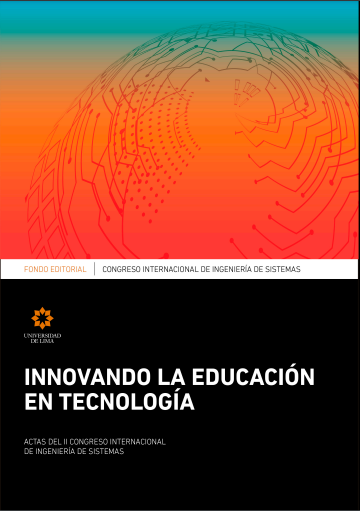What can innovation in engineering education do for you as a student and what can you do as a student for Innovation in engineering education?
DOI:
https://doi.org/10.26439/ciis2019.5498Keywords:
data-driven innovation, learning analytics, digital educationAbstract
Innovation in education in general and innovation in engineering education in particular must be supported by properly collected and analyzed data to guide decisionmaking processes. Today it is possible to collect data from many more stakeholders (not just students), and also to collect much more data from each stakeholder. Nevertheless, low-level data collected by monitoring the interactions of the multiple stakeholders with learning platforms and other computing systems must be transformed into meaningful high-level indicators and visualizations that guide decision-making processes. The aim of this paper is to discuss some notable trends in data-driven innovation in engineering education, including 1) improvement of educational content; 2) improvement of learners’ social interactions; 3) improvement of learners’ self-regulated learning skills; and 4) prediction of learners’ behavior. However, there are also significant risks associated with data collection and processing, such as privacy, transparency, biases, misinterpretations, etc., which must also be taken into account, and require creating specialized units and training the personnel in data management.
Downloads
References
Alario-Hoyos, C., Pérez-Sanagustín, M., Delgado-Kloos, C., Parada G., H. A., & MuñozOrganero, M. (2014). Delving into participants’ profiles and use of social tools in MOOCs. IEEE Transactions on Learning Technologies, 7(3), 260-266.
Alario‐Hoyos, C., Muñoz‐Merino, P. J., Pérez‐Sanagustín, M., Delgado Kloos, C., & Parada G., H. A. (2016). Who are the top contributors in a MOOC? Relating participants’ performance and contributions. Journal of Computer Assisted Learning, 32(3), 232-243.
Alario-Hoyos, C., Estévez-Ayres, I., Pérez-Sanagustín, M., Delgado Kloos, C., & FernándezPanadero, C. (2017). Understanding learners’ motivation and learning strategies in MOOCs. Intern. Review of Research in Open and Distributed Learning, 18(3), 119-137.
Alario-Hoyos, C., Estévez-Ayres, I., Delgado Kloos, C., Villena-Román, J., Muñoz-Merino, P. J., & Llorente-Pérez, E. (2019). Redesigning a freshman engineering course to promote active learning by flipping the classroom through the reuse of MOOCs. International Journal of Engineering Education, 35(1), 385-396.
Alonso-Mencía, M. E., Alario-Hoyos, C., Maldonado-Mahauad, J., Estévez-Ayres, I., PérezSanagustín, M., & Delgado Kloos, C. (2019). Self-regulated learning in MOOCs: lessons learned from a literature review. Educational Review (published online), 1-27.
Baepler, P., Walker, J. D., & Driessen, M. (2014). It’s not about seat time: Blending, flipping, and efficiency in active learning classrooms. Computers & Education, 78, 227-236.
Delgado Kloos, C., Catalán-Aguirre, C., Muñoz-Merino, P. J., Alario-Hoyos, C. (2018). Design of a Conversational Agent as an Educational Tool, In Learning with MOOCs 2018 (LWMOOCS V) (pp. 27-30). IEEE.
Dringus, L. P. (2012). Learning analytics considered harmful. Journal of Asynchronous Learning Networks, 16(3), 87-100.
Ferguson, R. (2012). Learning analytics: drivers, developments and challenges. International Journal of Technology Enhanced Learning, 4(5/6), 304-317.
Khalil, M., Taraghi, B., & Ebner, M. (2016). Engaging Learning Analytics in MOOCs: the good, the bad, and the ugly. In Proceedings of the International Conference on Education and New Developments (END) (pp. 3-7).
Moreno-Marcos, P. M., Alario-Hoyos, C., Muñoz-Merino, P. J., & Delgado Kloos, C. (2018). Prediction in MOOCs: A review and future research directions. IEEE Transactions on Learning Technologies (published online), 1-19.
Moreno-Marcos, P. M., Alario-Hoyos, C., Muñoz-Merino, P. J., Estévez-Ayres, I., & Delgado Kloos, C. (2018). Sentiment Analysis in MOOCs: A case study. In 2018 IEEE Global Engineering Education Conference (EDUCON) (pp. 1489-1496). IEEE.
Pérez-Sanagustín, M., Hilliger, I., Alario-Hoyos, C., Delgado Kloos, C., & Rayyan, S. (2017). H-MOOC framework: reusing MOOCs for hybrid education. Journal of Computing in Higher Education, 29(1), 47-64.
Ruipérez-Valiente, J. A., Muñoz-Merino, P. J., Leony, D., & Delgado Kloos, C. (2015). ALASKA: A learning analytics extension for better understanding the learning process in the Khan Academy platform. Computers in Human Behavior, 47, 139-148.
Slade, S., & Tait, A. (2019). Global guidelines: Ethics in learning analytics. Oslo: International Council for Open and Distance Education (ICDE).
Zimmerman, B. J. (2013). Theories of self-regulated learning and academic achievement: An overview and analysis. In Self-regulated learning and academic achievement (pp. 10-45). Routledge.






